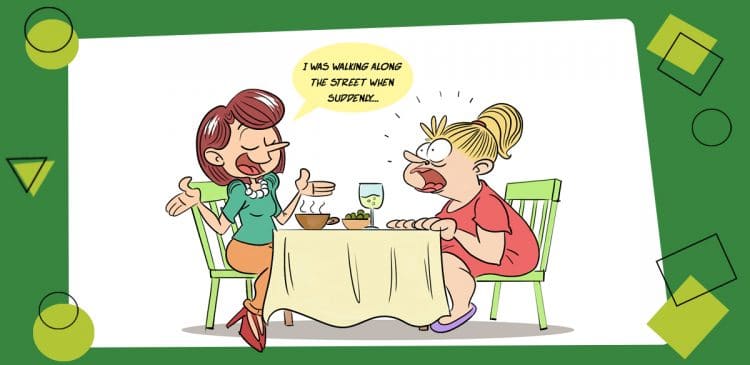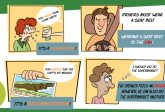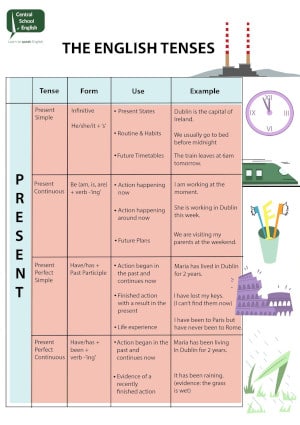Narrative Tenses

We all love a good story, don’t we? But telling a story in a second language is one of the most difficult things to do. One way we can improve our story telling skills is by knowing how to use the right verb tenses. Tenses we often use to tell stories are called narrative tenses. Luckily, the narrative tenses are tenses we already know. So with a little practice, your story telling skills will be top notch!
What are stories?
We generally tell stories about things that happened in the past. When we have conversations with people we might talk about things we have done, places we have visited and people we have met.
Conversations often move from the general to the specific. For example someone might ask if you have been on holidays this year (general). This could lead to you telling a story about something interesting, funny or shocking that happened on your last holiday (specific). This is when we start storytelling.
As we normally tell stories that happened in the past, it’s probably no surprise that we use past tenses. The four tenses we use most to tell stories are the past simple, the past continuous, the past perfect the past perfect continuous. In the context of telling stories we call these the narrative tenses.
Now let’s look at how we use these tenses to tell stories.
The Past Simple
We use the past simple to communicate the main events in a story. Most verbs used in a story are in the past simple tense. For example:
I suddenly saw a man.
I got up very early.
It was dark outside.
We often use words like first, then, after that and finally to link up the actions and events in a story. For example:
First I checked in at the hotel. Then I decided to walk around the town until I found a nice cafe where I had a bite to eat. I heard some strange music coming from a doorway and decided to investigate.
The Past Continuous
We use the past continuous to set the scene and to give background information. We often use the past continuous to talk about a longer action that is interrupted by another action. For example:
I was walking along the street one day when I suddenly saw a man.
I was working In Hong Kong when I met her. I knew my life would never be the same again.
We were swimming in the beautiful clear water when a strange woman arrived and started to shout at us.
The Past Perfect
We use the past perfect to mention things that happened at an earlier time than the time in the story. We can think of it as ‘the past of the past’.
For example:
I was walking along the street one day when I suddenly saw a man that I had been to secondary school with.
She had eyes like I had never seen before.
We arrived back at the hotel to find that everything had been stolen.
The Past Perfect Continuous
We use the past perfect continuous to talk about a continuous action that was happening up to another point in the past. We often say a period of time when we use the past perfect continuous tense.
For example:
I arrived quite late. Mary wasn’t too happy as she had been waiting for almost an hour.
I had been living in Dublin for two years. One day I had an interview for a new job.
Sue had been working in the company for three weeks before she met Tom.
Tell your own stories
Everybody has stories to tell. Think of some of your own stories. Strange or interesting things that have happened to you. Maybe you have told these stories in your own language many times. Now try telling them in English! You can practice telling stories in English with a friend or record yourself telling a story. This is putting your English skills to good use. Happy story stelling!
Test Yourself
Choose the correct tense of the verbs in brackets to fill the gaps.
One Saturday morning, my friends and I ………………..(drive) down to Surf Beach. It ……………….. (be) a beautiful day for surfing with a blue sky and a mild temperature. The waves that ……………….. (be) rolling into the shore ……………….. (promise) fun for us all. I ……………….. (paddle) out to the line-up and ……………….. (catch) a couple of really nice waves. This ……………….. (be) a great start to the day. I hadn’t ……………….. (be) in the water long after I ……………….. (realise) that I had been ……………….. (drift) parallel to the beach. I ……………….. (look) back to shore to see where I had ……………….. (leave) my gear. This was so I ……………….. (can) paddle back to my original position in the lineup. While I ……………….. (look) to shore, I ……………….. (hear) some splashing noises about thirty metres further out to sea. I ……………….. (be) immediately excited because I……………….. (assume) it would be dolphins playing in the water. I had often ………………..(see) this happen before, so it ……………….. (be) reasonable to assume that this……………….. (explain) the noises. I ……………….. (turn) around to see the show. I hadn’t……………….. (be) waiting long when suddenly something ……………….. (jump) out of the water and just ……………….. (hang) in the air for about one second before splashing back into the sea. As I ……………….. (be) sitting on my board, I remember thinking, “That’s a strange looking dolphin”, but I quickly ……………….. (realise) that I had ……………….. (be)mistaken. I ……………….. (look) at the other faces in the line-up and quickly ………………..(understand) I had ……………….. (see) a shark. Needless to say, I ……………….. (make) my way back to the beach immediately!
Idioms
Top notch: Excellent
Example: The Matrix is a top notch film but the sequel isn’t that great.
Thank you for reading our post. You’ll find more English grammar tips elsewhere on our site and if you’d like information on our online English courses from Dublin, please do not hesitate to contact us.





